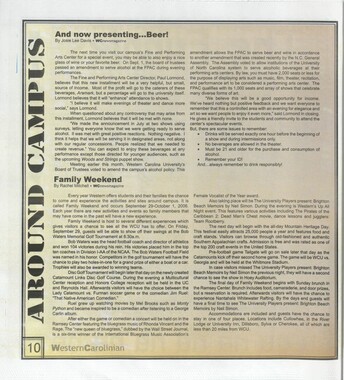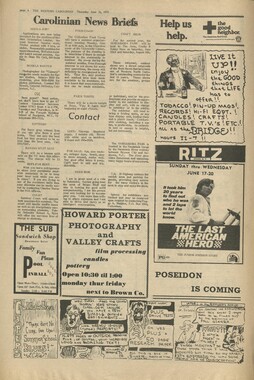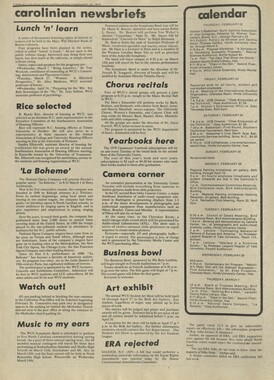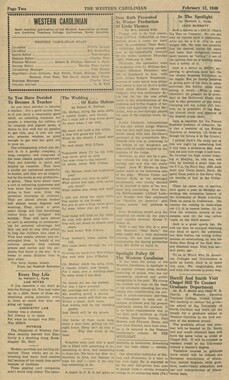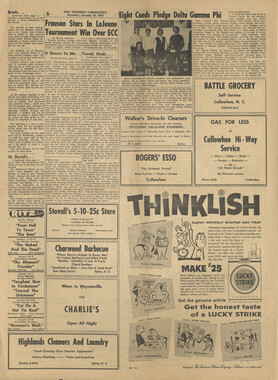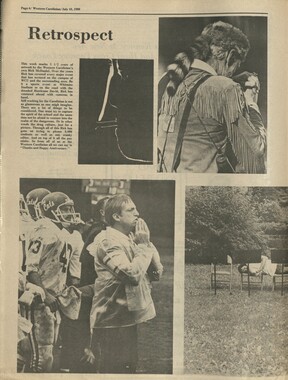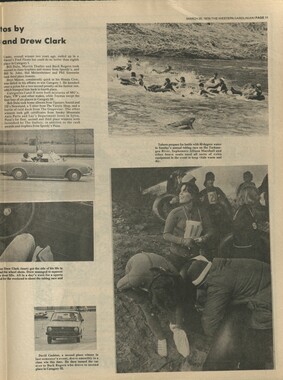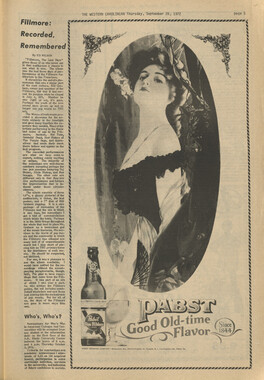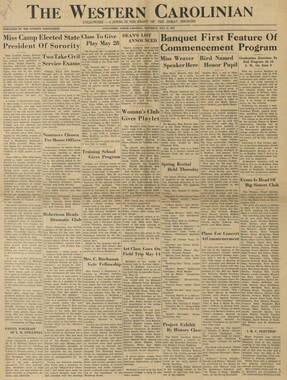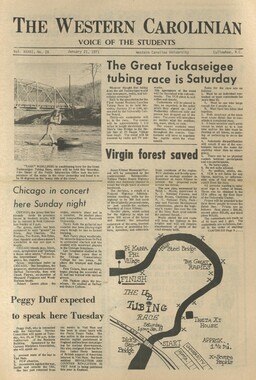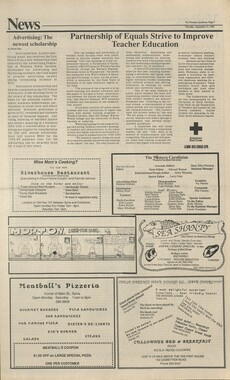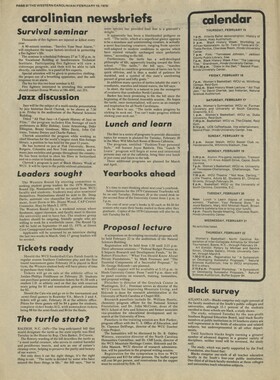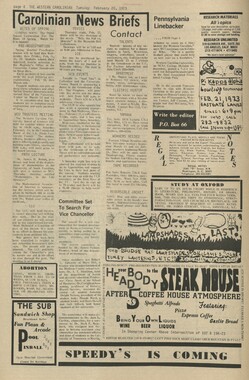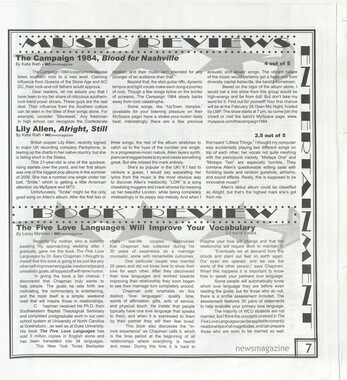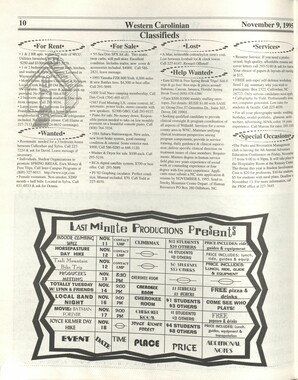Western Carolina University (20)
View all
- Canton Champion Fibre Company (2308)
- Cherokee Traditions (291)
- Civil War in Southern Appalachia (165)
- Craft Revival (1942)
- Great Smoky Mountains - A Park for America (2946)
- Highlights from Western Carolina University (430)
- Horace Kephart (941)
- Journeys Through Jackson (159)
- LGBTQIA+ Archive of Jackson County (85)
- Oral Histories of Western North Carolina (314)
- Picturing Appalachia (6873)
- Stories of Mountain Folk (413)
- Travel Western North Carolina (160)
- Western Carolina University Fine Art Museum Vitreograph Collection (129)
- Western Carolina University Herbarium (92)
- Western Carolina University: Making Memories (738)
- Western Carolina University Publications (2488)
- Western Carolina University Restricted Electronic Theses and Dissertations (146)
- Western North Carolina Regional Maps (71)
- World War II in Southern Appalachia (131)
University of North Carolina Asheville (6)
View all
- Allanstand Cottage Industries (62)
- Appalachian National Park Association (53)
- Bennett, Kelly, 1890-1974 (1463)
- Berry, Walter (76)
- Brasstown Carvers (40)
- Carver, George Washington, 1864?-1943 (26)
- Cathey, Joseph, 1803-1874 (1)
- Champion Fibre Company (233)
- Champion Paper and Fibre Company (297)
- Cherokee Indian Fair Association (16)
- Cherokee Language Program (22)
- Crowe, Amanda (40)
- Edmonston, Thomas Benton, 1842-1907 (7)
- Ensley, A. L. (Abraham Lincoln), 1865-1948 (275)
- Fromer, Irving Rhodes, 1913-1994 (70)
- George Butz (BFS 1907) (46)
- Goodrich, Frances Louisa (120)
- Grant, George Alexander, 1891-1964 (96)
- Heard, Marian Gladys (60)
- Kephart, Calvin, 1883-1969 (15)
- Kephart, Horace, 1862-1931 (313)
- Kephart, Laura, 1862-1954 (39)
- Laney, Gideon Thomas, 1889-1976 (439)
- Masa, George, 1881-1933 (61)
- McElhinney, William Julian, 1896-1953 (44)
- Niggli, Josephina, 1910-1983 (10)
- North Carolina Park Commission (105)
- Osborne, Kezia Stradley (9)
- Owens, Samuel Robert, 1918-1995 (11)
- Penland Weavers and Potters (36)
- Roberts, Vivienne (15)
- Roth, Albert, 1890-1974 (142)
- Schenck, Carl Alwin, 1868-1955 (1)
- Sherrill's Photography Studio (2565)
- Southern Highland Handicraft Guild (127)
- Southern Highlanders, Inc. (71)
- Stalcup, Jesse Bryson (46)
- Stearns, I. K. (213)
- Thompson, James Edward, 1880-1976 (226)
- United States. Indian Arts and Crafts Board (130)
- USFS (683)
- Vance, Zebulon Baird, 1830-1894 (1)
- Weaver, Zebulon, 1872-1948 (58)
- Western Carolina College (230)
- Western Carolina Teachers College (282)
- Western Carolina University (2005)
- Western Carolina University. Mountain Heritage Center (18)
- Whitman, Walt, 1819-1892 (10)
- Wilburn, Hiram Coleman, 1880-1967 (73)
- Williams, Isadora (3)
- Cain, Doreyl Ammons (0)
- Crittenden, Lorraine (0)
- Rhodes, Judy (0)
- Smith, Edward Clark (0)
- Appalachian Region, Southern (2569)
- Asheville (N.C.) (1923)
- Avery County (N.C.) (26)
- Blount County (Tenn.) (195)
- Buncombe County (N.C.) (1672)
- Cherokee County (N.C.) (283)
- Clay County (N.C.) (555)
- Graham County (N.C.) (236)
- Great Smoky Mountains National Park (N.C. and Tenn.) (519)
- Haywood County (N.C.) (3569)
- Henderson County (N.C.) (70)
- Jackson County (N.C.) (4909)
- Knox County (Tenn.) (35)
- Knoxville (Tenn.) (13)
- Lake Santeetlah (N.C.) (10)
- Macon County (N.C.) (420)
- Madison County (N.C.) (215)
- McDowell County (N.C.) (39)
- Mitchell County (N.C.) (132)
- Polk County (N.C.) (35)
- Qualla Boundary (982)
- Rutherford County (N.C.) (76)
- Swain County (N.C.) (2182)
- Transylvania County (N.C.) (270)
- Watauga County (N.C.) (12)
- Waynesville (N.C.) (86)
- Yancey County (N.C.) (72)
- Aerial Photographs (3)
- Aerial Views (60)
- Albums (books) (4)
- Articles (1)
- Artifacts (object Genre) (228)
- Bibliographies (1)
- Biography (general Genre) (2)
- Cards (information Artifacts) (38)
- Clippings (information Artifacts) (191)
- Copybooks (instructional Materials) (3)
- Crafts (art Genres) (622)
- Depictions (visual Works) (21)
- Design Drawings (1)
- Drawings (visual Works) (185)
- Envelopes (73)
- Exhibitions (events) (1)
- Facsimiles (reproductions) (1)
- Fiction (general Genre) (4)
- Financial Records (12)
- Fliers (printed Matter) (67)
- Glass Plate Negatives (381)
- Guidebooks (2)
- Internegatives (10)
- Interviews (815)
- Land Surveys (102)
- Letters (correspondence) (1013)
- Manuscripts (documents) (618)
- Maps (documents) (177)
- Memorandums (25)
- Minutes (administrative Records) (59)
- Negatives (photographs) (6090)
- Newsletters (1290)
- Newspapers (2)
- Notebooks (8)
- Occupation Currency (1)
- Paintings (visual Works) (1)
- Pen And Ink Drawings (1)
- Periodicals (193)
- Personal Narratives (10)
- Photographs (12976)
- Plans (maps) (1)
- Poetry (5)
- Portraits (4568)
- Postcards (329)
- Programs (documents) (181)
- Publications (documents) (2440)
- Questionnaires (65)
- Relief Prints (26)
- Sayings (literary Genre) (1)
- Scrapbooks (282)
- Sheet Music (2)
- Slides (photographs) (402)
- Songs (musical Compositions) (2)
- Sound Recordings (796)
- Specimens (92)
- Speeches (documents) (18)
- Tintypes (photographs) (8)
- Transcripts (322)
- Video Recordings (physical Artifacts) (23)
- Text Messages (0)
- A.L. Ensley Collection (275)
- Appalachian Industrial School Records (7)
- Appalachian National Park Association Records (336)
- Axley-Meroney Collection (2)
- Bayard Wootten Photograph Collection (20)
- Bethel Rural Community Organization Collection (7)
- Blumer Collection (5)
- C.W. Slagle Collection (20)
- Canton Area Historical Museum (2110)
- Carlos C. Campbell Collection (462)
- Cataloochee History Project (64)
- Cherokee Studies Collection (4)
- Daisy Dame Photograph Album (5)
- Daniel Boone VI Collection (1)
- Doris Ulmann Photograph Collection (112)
- Elizabeth H. Lasley Collection (1)
- Elizabeth Woolworth Szold Fleharty Collection (4)
- Frank Fry Collection (95)
- George Masa Collection (173)
- Gideon Laney Collection (452)
- Hazel Scarborough Collection (2)
- Hiram C. Wilburn Papers (28)
- Historic Photographs Collection (236)
- Horace Kephart Collection (861)
- Humbard Collection (33)
- Hunter and Weaver Families Collection (1)
- I. D. Blumenthal Collection (4)
- Isadora Williams Collection (4)
- Jesse Bryson Stalcup Collection (47)
- Jim Thompson Collection (224)
- John B. Battle Collection (7)
- John C. Campbell Folk School Records (80)
- John Parris Collection (6)
- Judaculla Rock project (2)
- Kelly Bennett Collection (1482)
- Love Family Papers (11)
- Major Wiley Parris Civil War Letters (3)
- Map Collection (12)
- McFee-Misemer Civil War Letters (34)
- Mountain Heritage Center Collection (4)
- Norburn - Robertson - Thomson Families Collection (44)
- Pauline Hood Collection (7)
- Pre-Guild Collection (2)
- Qualla Arts and Crafts Mutual Collection (12)
- R.A. Romanes Collection (681)
- Rosser H. Taylor Collection (1)
- Samuel Robert Owens Collection (94)
- Sara Madison Collection (144)
- Sherrill Studio Photo Collection (2558)
- Smoky Mountains Hiking Club Collection (616)
- Stories of Mountain Folk - Radio Programs (374)
- The Reporter, Western Carolina University (510)
- Venoy and Elizabeth Reed Collection (16)
- WCU Gender and Sexuality Oral History Project (32)
- WCU Mountain Heritage Center Oral Histories (25)
- WCU Oral History Collection - Mountain People, Mountain Lives (71)
- WCU Students Newspapers Collection (1920)
- Western North Carolina Tomorrow Black Oral History Project (69)
- William Williams Stringfield Collection (2)
- Zebulon Weaver Collection (109)
- African Americans (390)
- Appalachian Trail (35)
- Artisans (521)
- Cherokee art (84)
- Cherokee artists -- North Carolina (10)
- Cherokee language (21)
- Cherokee pottery (101)
- Cherokee women (208)
- Church buildings (189)
- Civilian Conservation Corps (U.S.) (111)
- College student newspapers and periodicals (2009)
- Dams (107)
- Dance (1023)
- Education (222)
- Floods (61)
- Folk music (1015)
- Forced removal, 1813-1903 (2)
- Forest conservation (220)
- Forests and forestry (1184)
- Gender nonconformity (4)
- Great Smoky Mountains National Park (N.C. and Tenn.) (181)
- Hunting (45)
- Landscape photography (25)
- Logging (119)
- Maps (83)
- Mines and mineral resources (8)
- North Carolina -- Maps (18)
- Paper industry (38)
- Postcards (255)
- Pottery (135)
- Railroad trains (72)
- Rural electrification -- North Carolina, Western (3)
- School integration -- Southern States (2)
- Segregation -- North Carolina, Western (5)
- Slavery (5)
- Sports (452)
- Storytelling (243)
- Waterfalls -- Great Smoky Mountains (N.C. and Tenn.) (66)
- Weaving -- Appalachian Region, Southern (280)
- Wood-carving -- Appalachian Region, Southern (328)
- World War, 1939-1945 (173)
Western Carolinian Volume 34 Number 19
Item
Item’s are ‘child’ level descriptions to ‘parent’ objects, (e.g. one page of a whole book).
-
-
Thursday, December 5,1968 THE WESTERN CAROLINIAN Page 5 \cRrri(X)SCOPE By Store Guimond 1 Funny Girl ' It would be useless to search in the critics well-worn grab- bag of phrases to find expletives describing "Funny Girl" The film is quite simply, a creditable accomplishment in its own right and certainly the most enjoyable musical to appear since "My Fair Lady." The various determinants that contribute to any film's success can—in the case of "Funny Girl"—almost be reduced to a singular: Barbra Striesand, its phenomenal star, more of whom we shall discuss later. There are, however, other elements besides the leading lady working against a rather formidable problem and perhaps the only way to approach this review is to examine the major ones seperately—beginning with the obstacle. Isobel Lennart's script—a treatment of 1930's stage star Fanny Brice's career in relation to her ill-starred marriage to gambler Nick Gunstean is a sketchy , musical version of the Harlow-Peter Duchin- Eddie Cantor-Helen Morgan stories. The sentimental saga of the lower-class kid who makes it big on the Boards after hardships, who must encounter numerous personal- usually romantic - -traumas while carrying on the show is as familiar as the Late, Late Show. One might argue at this point that the material and theatrical era under examination justify such an antiquated structure, and, as long as "Funny Girl" runs fair weather, the assumption is valid-after ail, no one expects highly literate, inventive stories behind musical- comedy, the tunes, laughs, dances, and general outer trappings being the primary ingredients. Witty Script In all fairness, too, Miss Lennart's script is witty and acceptable until intermission. The first act affords its players, director, and musical collaborators to play loose and free Fanny's early rise to stardom and courtship with Gunstein-the gags and business typically period, the show teeming with nostalgic conotations of the opulent Ziegfeld era. After intermission, though, Miss Lennart's attempt to raise Fanny, Nick, and their romance to post-Freudian, near- tragic proportions grows tiring on both our patience and seats. The result is a bitter taste of the overall as the final curtain closes, and, were it not for a performance from some leading lady, it is doubtful that the play and film, despite an excellent score - would have survived on Broadway or become one of the year's best pictures. Luckily, "Funny Girl's" shakey ingredients have been served-up well by director William Wyler attempting his first hand at musical comedy. There was little Wyler could do but let Miss Streisand carry the show, the script and score being essentially a one-woman affair. Wyler has wisely en- schewed any attempt to impress his usually strong hand on the film, merely guiding his supporting players assuredly and resisting temptations to "camp"up the earlier proceedings or play the later scenes for anything but soapy dramatics. The supporting roles in "Funny Girl" are expectedly one-demensional and handled with appropriate professional- % The InUrnationalilt xtmmmmmmmmtmt* ism most notably by Kay Med- ford and Walter Pidgeon. The only part approaching Fanny's in size or scope is the lamentably drawn Nick Arstein. Depending on individual interpretation, Arnstein may be played as either a slick artificially groomed gambler unworthy of Fanny or a smoothly suave gentleman-glamour boy unable to play life's gambles. Omar Sharif plays the latter, doing as well as imaginable with a part that is really noting more than a bouncing wall for Streisand's reverberations. This brings us back to Miss Streisand and I wish there was space to reprint half the praise she's received. The role has become not so much Streisand's ambition to prove the world she is among the -if no the- "greatest stars," not that there is much pushing to do. Those of us watching her career for the past six years are not surprized by her ability to act— she's always done so consum- ately on her records. There is no singer-entertainer in the world today with her versatility. She has handled ballads, love songs, satires and comical sketches on the range of her albums and "Funny Girl" gives her the occasion to do likewise-vocally and non-vo- cally-on the screen. Under the unconventional, often bold musical staging of Herbert Ross, Miss Streisand works with the Jules Stein- Bob Merrill score -one of the better Broadway scores this decade—bringing to each selection the Streisand nuance for timing and interpretation. "I'm the Greatest Star" is the show's first stopper and Miss Streisand sells herself so there's no need to convince us any furh us any further. The song is followed with a chorus-girl "Roller Skate Rag" and whoever was responsible, either Wyler or Ross has staged Miss Streisand in one of the funniest sequences ever filmed. To close the first act, Ross has Streisand belting "Don't Rain on My Parade" while moving from a cab to a train to a tugboat where she manages to upstage the Statue of Liberty. This number is so dynamic we wonder what can follow. Intermission follows with only three songs and much talk before Streisand's last number, "My Man"; but she makes the last act's tedious moments all worthwhile in these colsing mo- memts. She delivers the song against a nearly unbroken black drop, minimal blue and red lights the only illumination. The song unfolds, the camera trained on her face and those fantastic hands with which she is able to bind any audience. As she sings the final note- one of those unusually sustained intense ones—we are left with Streisand's image—an entertainer-actress-singer who pours her totality and completeness into everything she touches. This is Streisand; This is "Funny Girl." Mini-Notions 1 1 »m»ge Bill Biff err # Today the United Nations stands on the threshold of developing a voting system far more undemocratic than the United States' antiquated Electoral College. By democratic standards of one man one vote the present United Nations system could soon be an oligarchy of mini-states each equal to larger nations such as the United States. Should these states be admitted as full-fledged members? Legally the answer to this question must be yes. Since these mini-nations are sovereign they are internationally equal regardless of size or population. This means that An- guilla, a tiny island nation In the Caribbean with a population of 6,000, is equal to and has the same rights as the United States which has a population of 200,000,000. It is an established principle of international law that no nation large of small, no matter how powerful has the right to step across the border of its neighbor regardless of how small or weak that nation may be. This establishes the principle of sovereignty and equality among nation. From the legal stand point full membership is the only conceivable way in which mini- states can be admitted to world organizations. This is particularly distasteful to the great powers. Another problem of mini- states is that by nature they are more numerous. Theoretically a block of mini-states with a combined population 8 to 10 million people could easily assume control over the super powers representing the rest of the world's population. One possible way of solving this problem would be to redraw the lines of representation in the United Nations. This could be done along the same lines as the United States House of Representatives. Each nation would be divided into districts of relatively equal population. Each distract would then have one seat and one vote. This plan would allow nations with large populations more than one vote. Proportionately, the United States would then be allowed between 70 and 80 votes in the United Nations; countries like Anguil- la would be allowed one. One problem created by this plan would be the tendancy to take representation away from states on the national level and place it on a regional level. This could in time lead to a weakening of the larger nations on an international level and splinter them into several regions of international importance. This follows the Augustinian small unit theory for world peace. In this theory St, Augustine states that peace can best be acheived by a society of small states living together in amity, unbroken by jealousies. This plan for representation, though workable, could destroy the national structure of the world as we know it today and possibly lead to a true world organization. This plan, as well as the Augustinian idea of peace through small states, would not receive popular support in today's world of nationalism and racial superiority. Futher more, it goes against the trends of the times where the larger states are turning to each other for security and economic prosperity. With this trend in mind the only workable solution would be to encourage these mini- states to exist outside of the world organization as independent bodies or protectorate of the United Nation. The Broken Window By Freeman D. Jones LAST GASP (A Sort-Of Christmas Dirge With Apologies to Clement C. Moore) On this night before Christmas When all through the house No creature is stirring Not even a mouse And stockings be hung By the chimney with care, Look around you America Are your children there? Are your children nestled All snug in their bed Or asleep in the park In the arms of a "Head"? Do they march to the sound Of a different tin drum? From whence do their visions Of sugar plums come? And parents sit 'round And wring on their hands And murmuring softly say They "Just can't understand." "Dirty rotten communist creep It'll serve them all right if They have no place to sleep." "Just look at that hair Halfway down to their knees You know just by looking They all must have fleas." "Their clothes are all dirty Their faces are hairy That little guy there Hell! he looks like a fairy." Haw! Haw! Haw! "I don't care what anyone has to say We knew how to handle Them Back in my day." "What they need is a bath And a haircut or two And if that doesn't work Put them all in a zoo." Haw! Haw! Haw! "Well I tell you one thing I'd just like to know Why? I gave my kid all the best Money could buy," (Last Gasp) "On the night before Christmas Alone in the dark Two frightened young people Asleep in the park. To fight off the chill Of the new-fallen snow They clutch to each other Though neither one knows Why they're there in the first place Just no place else to go. Home is abstract, uncertain. Something neither equates With love /understanding; Just a name with no face. The girl-child is troubled Cries soft in her fright Things are out there waiting For her in the night. An Ominous silence Clouds over the moon The boy-child wakens "Why so soon? Why so soon?" And out in the darkness Arises a clatter They spring to their feet 'Cause they know what's the matter. The policemen are coming Happy Christmas to all They've got their orders (Their Own Christmas Ball). Rid the park of the Vermin Kill a few commies maybe Go home and play Santa Then sleep like a baby. More rapid than eagles The blue-shirts descend To main and wound And rip up and rend. To them everyone In the park is the same And they whistle and shout And call them all names. Dirty commie! Take that! Bash! Long haired hippie queer! We'll see you all dead. We'll see you all dead Before the New Year! Bashing and smashing and Clobber a Vixen Vomit and bleed in A Donnybrook Blitzen. And then in a twinkling With no one to blab, Boy-child and girl-child In the morgue on a slab. And out in the suburbs Drunker than hell Ma & Pa watching newscasts And muttering "Well. . , Don't know what's going on" "Glad the cops brought a halt" "Rotten brats anyhow" "Glad it isn't my fault," Now whether you know Or whether you care, Such things as this happen So as the New Year Starts off — stop a moment Discontinue this game You're running out of Other people to blame. Look, America! This is your kid The result, it's for certain Of something you did. If you ask your mother for onefried egg for breakfast and she gives you two fried eggs and you eat both of them, who is better at arithmatic, you or your mother? Carl Sandburg
Object
Object’s are ‘parent’ level descriptions to ‘children’ items, (e.g. a book with pages).
-
The Western Carolinian is Western Carolina University’s student-run newspaper. The paper was published as the Cullowhee Yodel from 1924 to 1931 before changing its name to The Western Carolinian in 1933.
-
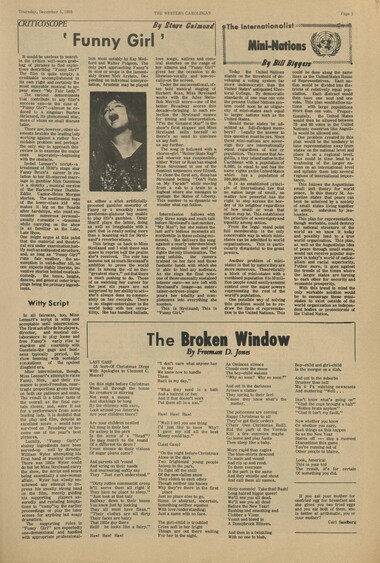



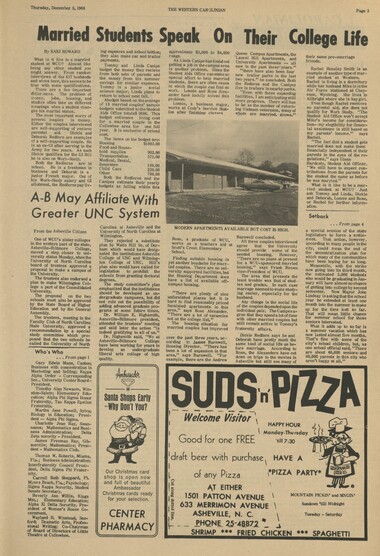
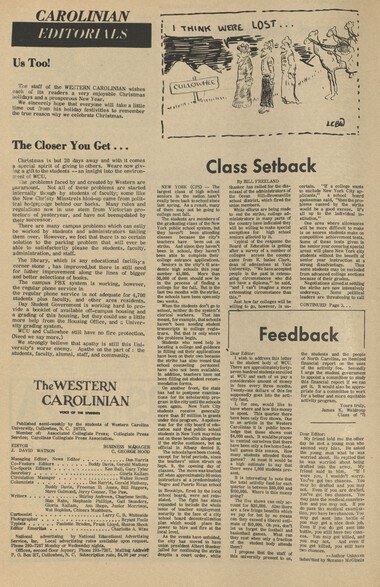

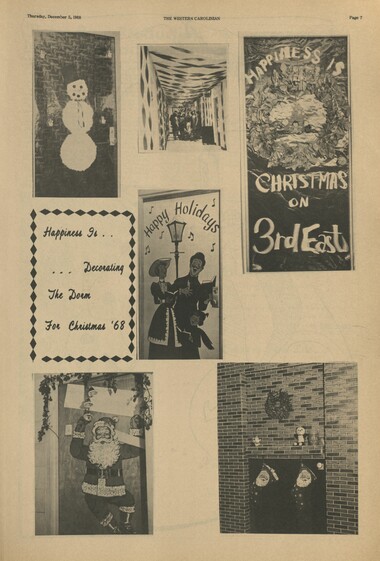
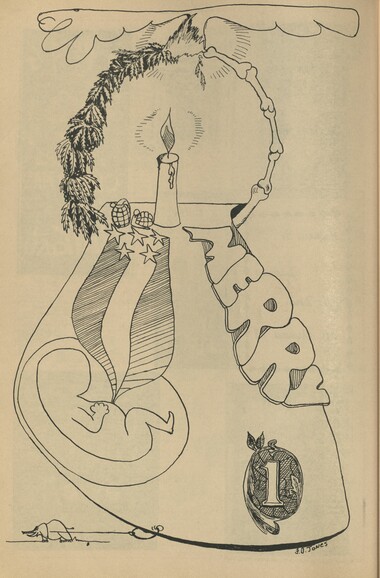

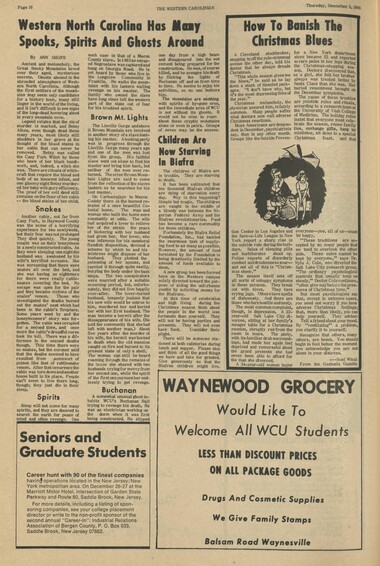
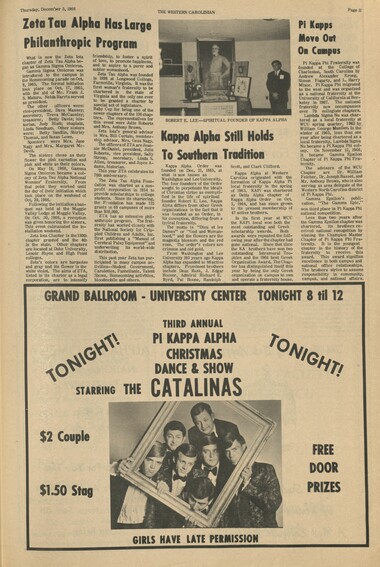
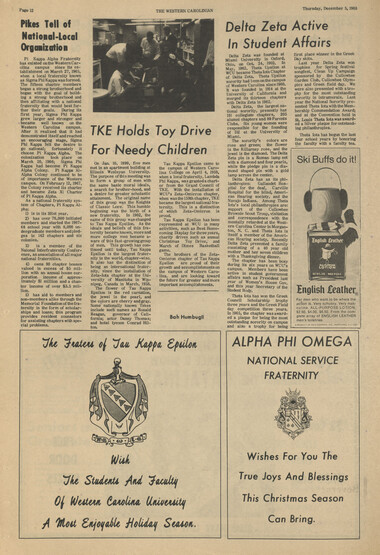
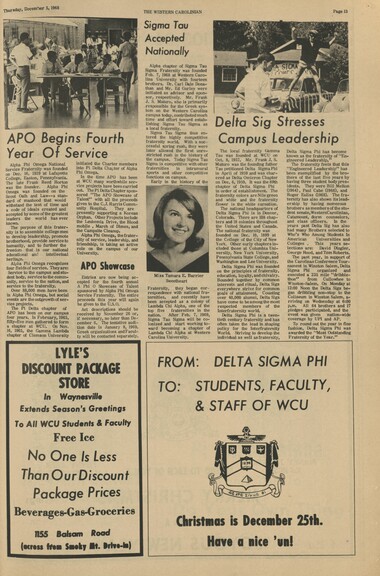
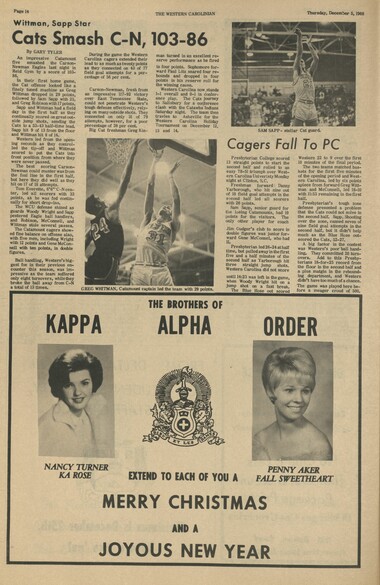
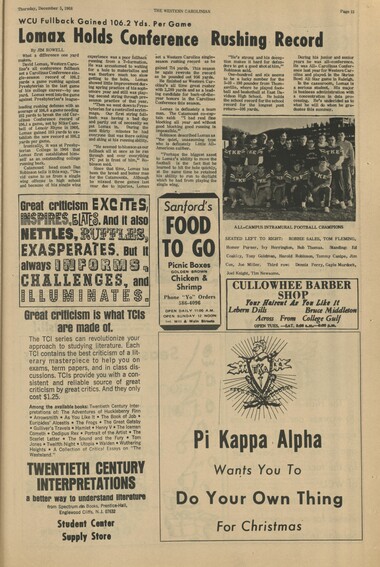
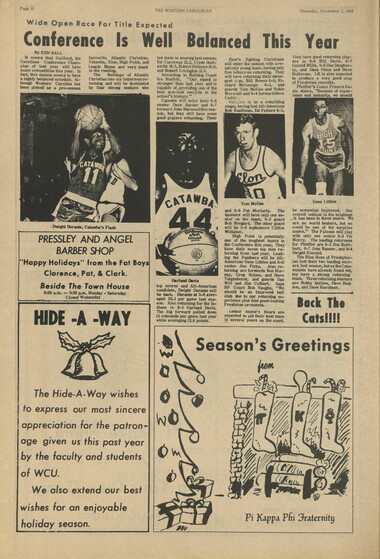
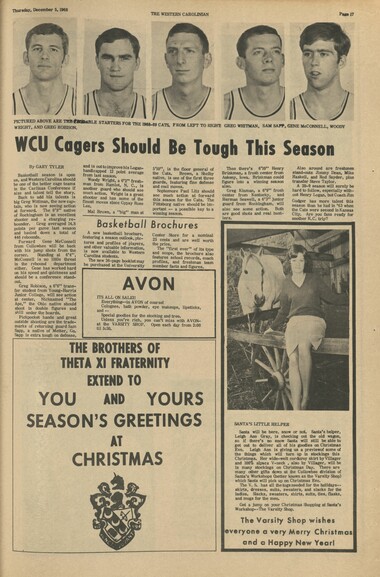


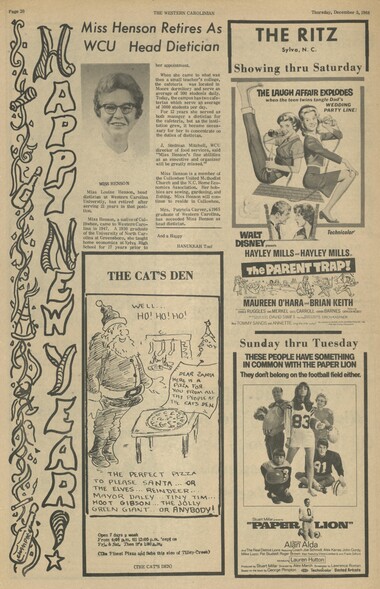
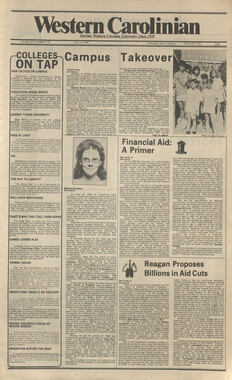

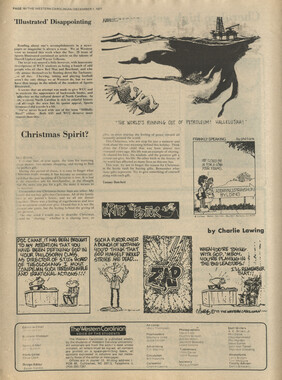
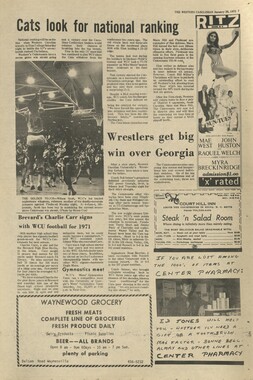
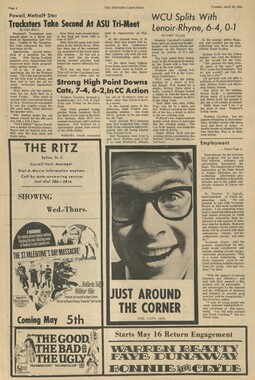
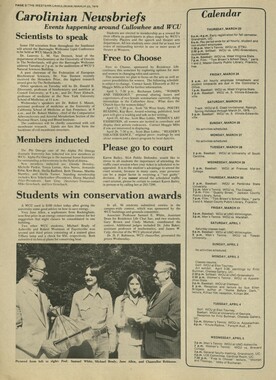
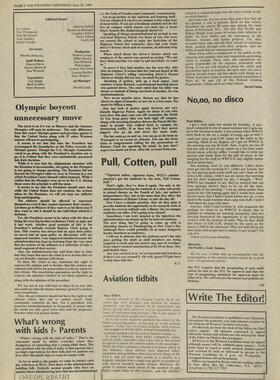
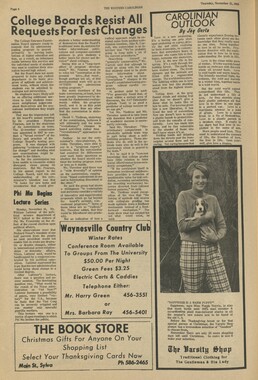
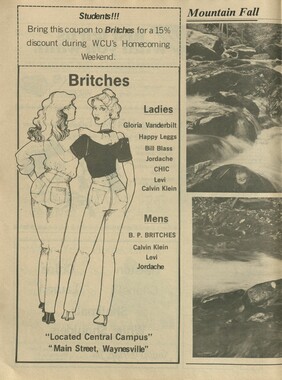
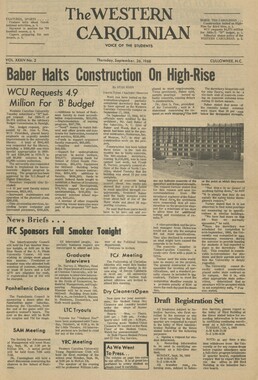
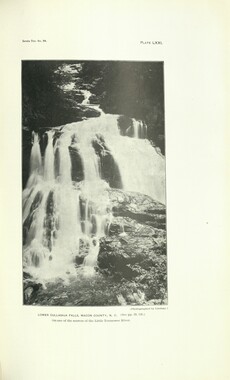

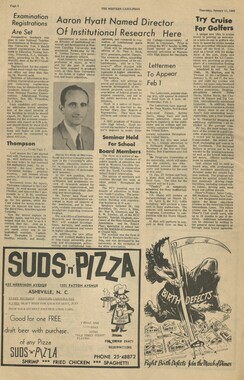
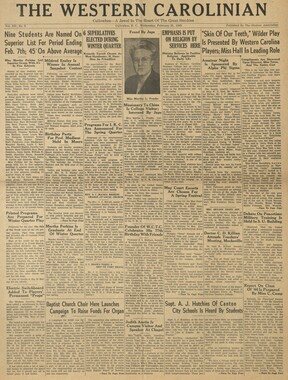
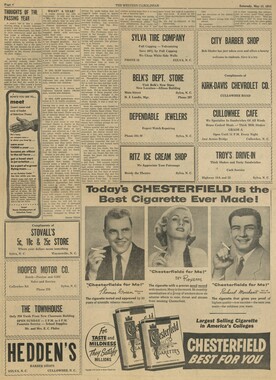
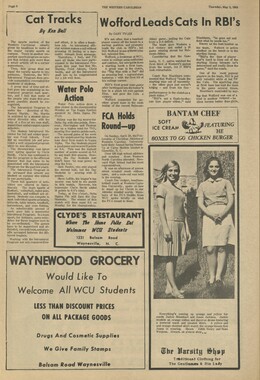
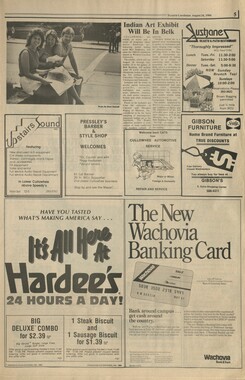

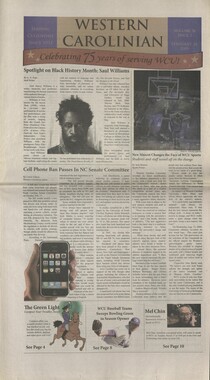
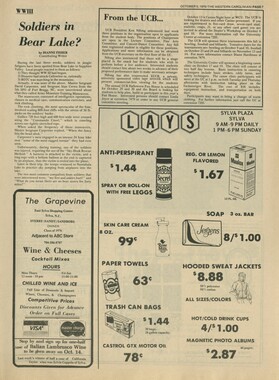

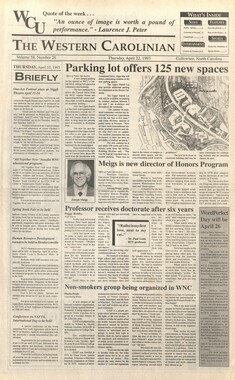
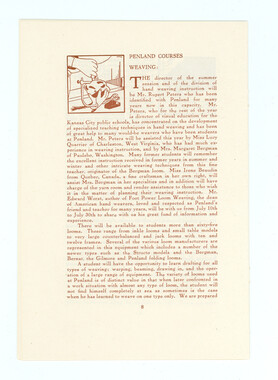
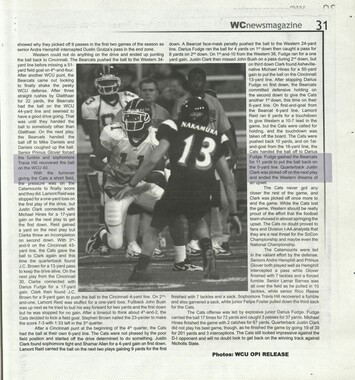
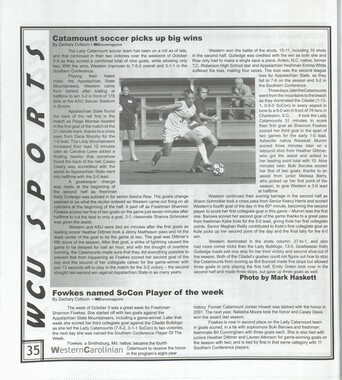
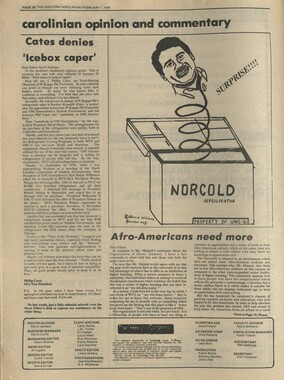
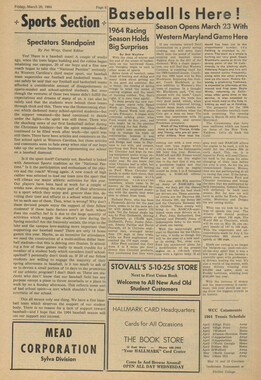
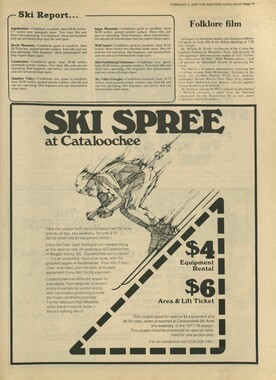
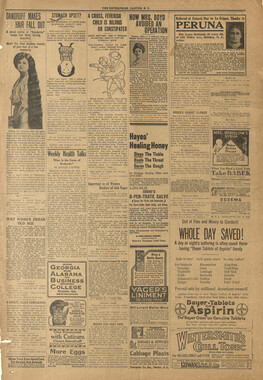
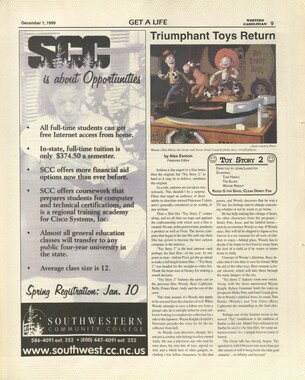
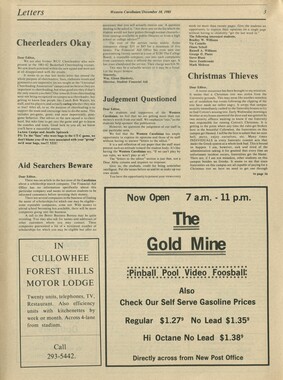
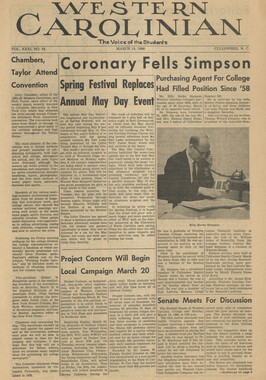
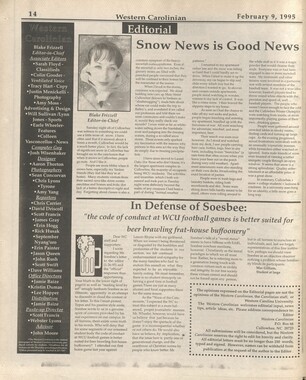
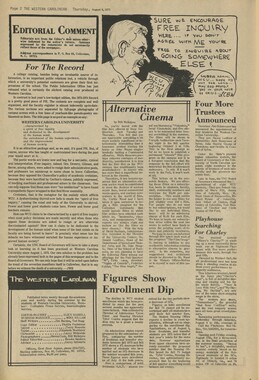

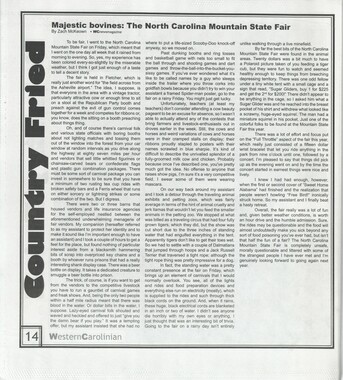
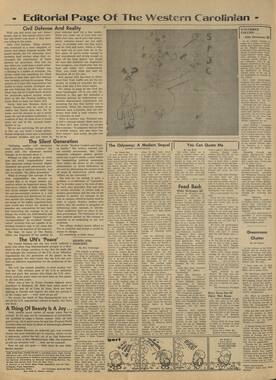


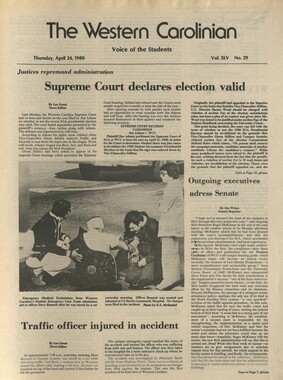

![hl_westerncarolinian_2004_[vol69_no04]_01.jpg](/media/w400h300/wcu_publications/hl_westerncarolinian_2004_[vol69_no04]_01.jpg)
